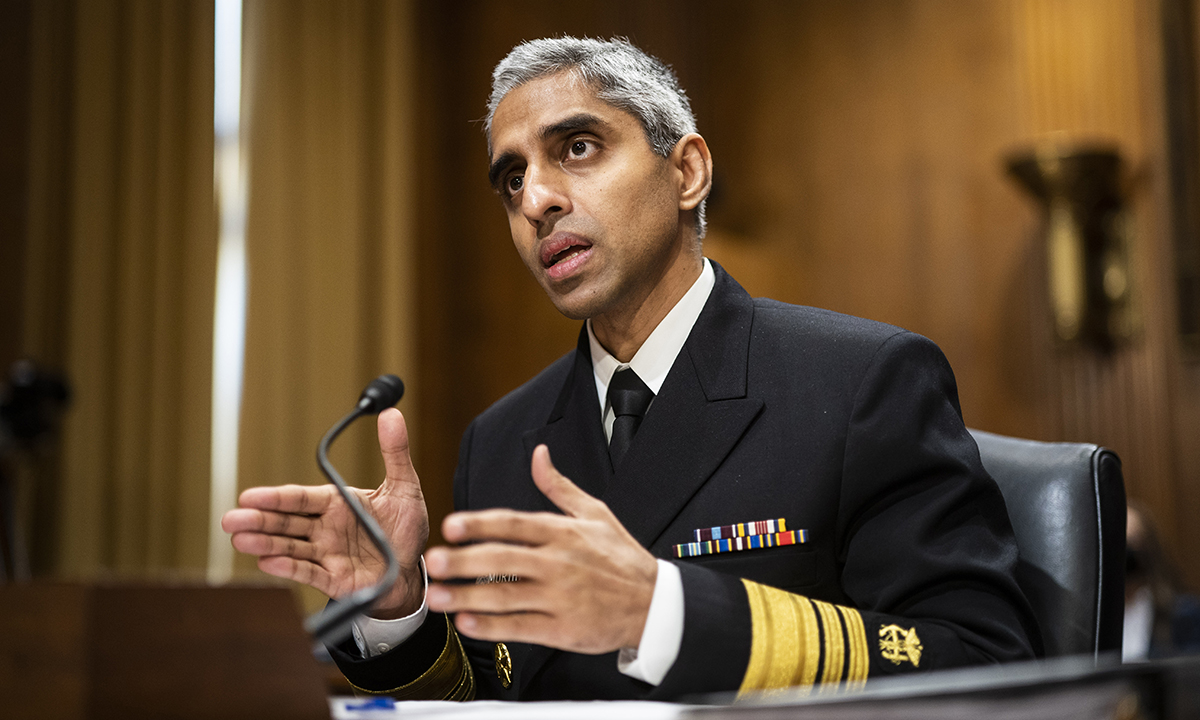Surgeon General’s Social Media Warning May Impact School District Legal Surge
What this week’s dire warning from the Nation’s Top Doctor means for families and school districts suing social media companies

Get stories like this delivered straight to your inbox. Sign up for The 74 Newsletter
The U.S. Surgeon General’s dire warnings on the youth mental health crisis will likely prompt more school districts to sue big tech companies, according to advocates and lawyers involved in ongoing litigation.
Surgeon general Vivek Murthy warned Tuesday in a 19-page advisory that social media poses a profound risk to children, with excessive use impacting sleep, relationships and depression that can lead to thoughts of suicide. The report may also shape national policy as legislators and courts take on algorithms, privacy and age policies, and access to platforms.
“We are in the middle of a national youth mental health crisis, and I am concerned that social media is an important driver of that crisis – one that we must urgently address,” Murthy said in a statement.
According to Murthy’s report, even as 95% of teens and 40% of 8-12 year olds use social media, there is no evidence platforms are “sufficiently safe.” Spending more than three hours daily doubles their risk of poor mental health, including depression and anxiety symptoms, the report states. The average daily use for teens is three and a half hours, research shows.
The surgeon general also noted push notifications, infinite scrolls, and public like lists are particularly enticing and concerning for youth in early adolescence who frequently compare themselves to peers.
Citing many of the same concerns Murthy identified, more than 100 school districts nationwide have sued companies including TikTok, Snap, YouTube and Meta for their allegedly addictive algorithms that they say harm students.
Lawyers at the forefront of district litigation said the surgeon general’s report strengthens their claims.
“I think you’re going to see even more file as a result of this advisory,” said Dean Kawamoto, counsel with Keller Rohrback, the leading Seattle-based law firm representing several districts who hope to make platforms less harmful.
But some lawyers not involved in the case remain skeptical, believing that while the report will inform the national conversation, it does not carry enough weight to make waves in court.
“It is tentative and ambiguous and not really definitive in the way that most courts are going to want when ruling on something being dangerous,” said Rebecca Tushnet, First Amendment expert and Harvard Law professor.
In contrast to the definitive stance on, for example, smoking, the surgeon general acknowledged social media also holds benefits. Platforms can help create a community for marginalized young people.
Active Minds, one of the nation’s leading mental health advocacy nonprofits, urged families and policy makers curbing social media access in the wake of the advisory to consider what may be lost.
Bans could cut off access to critical sex education or communities where isolated LGBTQ, Black and Brown youth feel they belong — similar reasons other organizations publicly oppose the Kids Online Safety Act.
“While the harmful impacts of social media usage on youth mental health certainly exist, are well documented, and require additional research…we’ve also heard from many youth and young adults, particularly from vulnerable communities, who credit social media with saving their lives,” Active Minds told The 74.
Among the practical recommendations for families and tech companies: set limits in the house around meals or bedtime; reach out for help; share data that could further research on health impacts; enforce age minimums; develop safety standards by age; and increase funding for research.
“Our children and adolescents don’t have the luxury of waiting years until we know the full extent of social media’s impact. Their childhoods and development are happening now,” the report states.
About two thirds of adolescents are “often” or “sometimes” exposed to hate-based content. Six in 10 girls have been contacted by a stranger on social media in ways that make them uncomfortable. Young girls and LGBTQ youth are more likely than their peers to experience cyberbullying or harassment, which about 75% of adolescents believe is poorly managed by social media sites.
At the same time, in a recent survey of young TikTok users, 64% said they would rather give up their right to vote for one year than give up their social media accounts.
Meta and TikTok did not respond to requests for comment.
“As a messaging service for real friends, we applaud the Surgeon General’s principled approach to protecting teens from the ills of traditional social media platforms,” a spokesperson for Snap Inc, owner of SnapChat, told The 74.
Get stories like these delivered straight to your inbox. Sign up for The 74 Newsletter

;)
